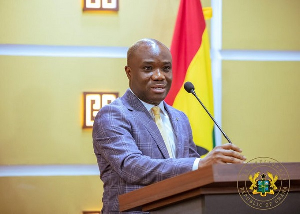16th May marks the International Day of Light. This is a day set aside by UNESCO to celebrate and raise awareness of the potential of light. The tide of light-based technologies is still on the ascendency, and hence the need to harness the unprecedented opportunities for improvements in agriculture and the delivery of energy and social services, for wealth creation and for health.
Ghana this year re-adopts the 2019 adapted theme “stimulating young people and women, especially in developing countries, to study science and engineering” as the theme for the 2020 celebration.
It is therefore a joy to see young Ghanaians harnessing the technologies of light to improve upon hand-wash hygiene in this era of Covid-19, not only to improve upon the veronica bucket but to create jobs. We, therefore, salute Mr Richard Kwarteng, a resident of Kumasi in the Ashanti Region, for harnessing light in his solar-powered automated hand washing machine that enables individuals to wash their hands under running water without touching the tap or knob of the water receptacle. We also salute the Ghana Standard Authority (GSA) for testing and certifying the product for mass production for the international market at no cost. This feat by the GSA in line with spirit of the proponents of IDL which is to attract young minds and innovators to come out with new ideas and inventions in the application of light-based technologies for the benefit of the African Continent.
This year marks the 60th anniversary of the Laser - a powerful tool in this century that has significantly contributed to the fields of communication, medicine, agriculture, environment, transportation and all other spheres of life.
Light, which is a form of energy, does not only illuminate to bring brightness when darkness falls but is a versatile tool used for humankind’s comfort. Light-based technologies respond to needs in the areas of agriculture, communications, health and entertainment, playing the central role in fulfilling the developmental agenda and serving as a major economic driver of all nations. The subject of light ranges wide and cuts across sciences and culture. Its multi-disciplinary dimension is part of its appeal and strength make it especially attractive to promote science and technology for sustainable development to improve the quality of life. In short, light is an essential part of our art and cultural heritage and a unifying symbol of our identity in the world.
Background to the celebration
Ghana has been instrumental in these celebrations. The country placed a resolution on behalf of the Scientific Partnership; on the agenda of the 190th Session of the UNESCO Executive Board at Paris, 3-18 October 2012 and UNESCO General Conference in 2013 with overwhelming support, particularly from Mexico, Russia Federation, and New Zealand. A resolution passed by the UN at the 68th session of the General Assembly was adopted on the 20th December 2013 proclaiming 2015 as the International Year of Light and Light-based Technologies.
International Day of Light
Ghana, Mexico, New Zealand and the Russian Federation moved for the sustenance of the momentum of the IYL by presenting again to UNESCO, during the 200th Session of the Executive Board (2016) on the need to observe an International Day of Light on 16th May every year as International Day of Light starting from 2018. This was accepted and has become a yearly celebration.
On 16th May, 2018, the Museum of Science and Technology (MST) under the Ghana Museums and Monuments Board (GMMB) and the Ghana National Commission for UNESCO, University of Ghana (Physics and Archaeology departments) as well as University of Cape Coast’s Laser and Fiber Optics Centre were able to commemorate the first International Day of Light under the Theme: “Light and Light-Based Technologies”.
Museum of Light
The day was also used to formally open Ghana’s Museum of Light which was made possible by contribution from UNESCO’s Participation Program and the Ghana National Commission for UNESCO. The museum of Light, currently located in the Museum of Science and Technology, Adabraka, was established to commemorate Ghana’s response to the celebration of the International Year of Light and Light-Based Technologies, 2015, and underscore the nation’s commitment to harnessing light and light-based technologies for Africa’s Development. It is worth a visit by you and your children.
It is our hope that in spite of the challenges of the time posed by the Covid-19, Research institutions in Ghana like the Laser and Fibre Optic Centre (LAFOC) of the University of Cape-Coast, the School of Nuclear and Allied Sciences of the University of Ghana, the institutes of the Centre for Scientific and Industrial Research (CSIR) and other research institutions in Ghana will harness the technologies of light to fight the Covid-19.
Opinions of Friday, 15 May 2020
Columnist: Apollonius Osei-Akoto







![Akwatia MP, Ernest Yaw Kumi [L] and legal practitioner, Martin Kpebu Akwatia MP, Ernest Yaw Kumi [L] and legal practitioner, Martin Kpebu](https://cdn.ghanaweb.com/imagelib/pics/863/86389168.295.jpg)











